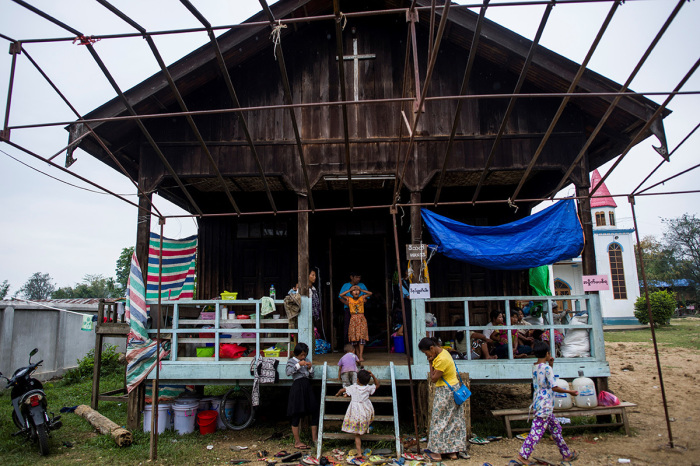Miscarriages and stillbirths on the rise as violence escalates in war-torn Myanmar

Shan State in Myanmar is witnessing a distressing increase in miscarriages and stillbirths as pregnant mothers fleeing conflict are forced to give birth in perilous conditions in remote jungles, according to a new report by a United Kingdom-based charity.
The report by Humanitarian Aid Relief Trust attributes the elevated risk of adverse pregnancy outcomes to the lack of specialized care and the daily struggle for food faced by these mothers.
HART says its investigation draws from firsthand accounts of medical workers on the front lines, witnesses of atrocities and local human rights activists.
The report details the escalating military offensives against Shan villages, including the deliberate targeting of hospitals and medical facilities. This violence has led to massive displacement, with over 100,000 people fleeing their homes in Shan State alone since October 2023. The fighting has severely disrupted access to essential services like maternal, newborn and child health care.
“As more and more people seek shelter in remote locations, HART is scaling up its humanitarian response,” HART Chief Executive Sam Mason said, highlighting the critical role of local partners in providing emergency obstetric services to ensure safe childbirth and newborn care.
Baroness Cox, a member of the U.K. House of Lords, founded HART in 2004. The group works in Myanmar through local partners.
Over three years following its coup d’état in February 2021, Myanmar’s junta faced recent military challenges. Ethnic armed groups, as part of Operation 1027, have overrun hundreds of its military bases, indicating a major loss of control and morale. Within its ranks, the junta is experiencing defections and surrenders.
“Operation 1027 represented a glimmer of hope to the wider pro-democracy movement,” says the report. “However, it provoked a brutal response from local military commanders, who doubled down on their efforts to suppress the opposition. The escalation of conflict in Shan state represents the heaviest clashes in Burma since the military coup in 2021.”
The conflict in Shan State has also restricted access to food and medicines, further endangering the health of pregnant women and their babies, the report stresses.
Frontline medical workers report an increase in miscarriages and stillbirths, with many babies born prematurely or suffering from infections due to inadequate healthcare facilities.
A local partner of HART, who remains anonymous for security reasons, notes that they are the sole providers of medical care in many areas.
The report also sheds light on the broader implications of the conflict, including the targeting of civilian infrastructure and the use of banned weaponry like cluster munitions by military forces.
These actions have caused immediate harm to civilians and posed long-term threats to their safety and well-being.
In response to the escalating crisis, HART calls on international powers to intensify their efforts in Myanmar, urging neighboring countries Thailand and India to facilitate the delivery of cross-border humanitarian aid. HART urges a global response to address the humanitarian and human rights crisis in the region.
The situation in Shan State is part of a larger pattern of violence and displacement in Myanmar, with ethnic and religious minorities bearing the brunt of the military’s brutal campaign. The military’s tactics, including the use of scorched earth strategies and targeting of non-military infrastructure, have led to widespread human rights violations and a public health crisis.
The international community has scrutinized Myanmar’s military, locally known as Tatmadaw, for its relentless crackdown on civilians. Both military and rebel actions characterize the ongoing violence and continue to destabilize the state, affecting thousands of lives and altering the social fabric of this troubled region.
Last September, the regional bloc Association of Southeast Asian Nations voted to remove Myanmar from its scheduled 2026 chairmanship, opting for the Philippines instead.
Although a majority of Myanmar’s population is ethnic Burman and Buddhist, the country is home to several ethnic and religious communities. About 20%-30% of the ethnic Karen are Christian, and in Chin and Kachin States, where the majority of the population is Christian, the military finds a target-rich environment for its operations.
The long-standing persecution has led many to flee Myanmar, seeking refuge in neighboring countries like India and Thailand. Some have even resettled as far away as the United States and Australia. However, many remain in refugee camps close to the Myanmar border, facing decades of uncertainty.





























